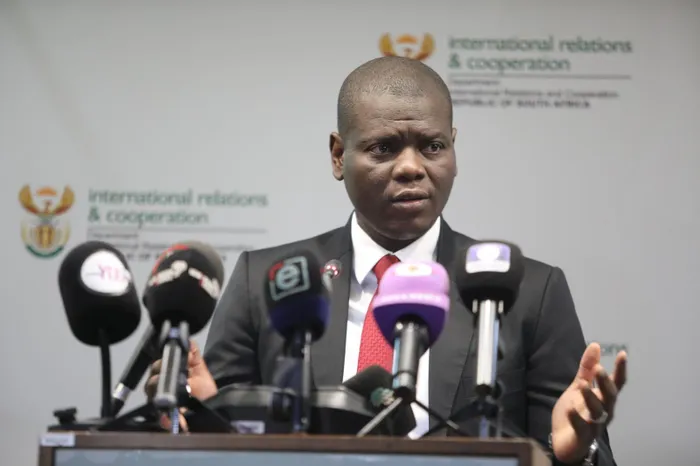SA's G20 diplomatic strategy: Strengthening trade ties and advocating for peace

Minister Ronald Lamola has reaffirmed South Africa's commitment to BRICS and global peace efforts, emphasising the need for diplomatic solutions to rising global tensions.
Image: Oupa Mokoena/Independent Newspapers
As a prominent player on the world stage, South Africa is poised to assert its presence through strategic diplomatic efforts.
Ahead of the G20 leaders summit in November, Minister of International Relations and Cooperation Ronald Lamola discussed the country's foreign policy priorities and its approach to global challenges.
He restated SA's unwavering commitment to peacekeeping missions in conflict-affected countries, citing ongoing conflicts in the Democratic Republic of Congo (DRC), Russia and Ukraine, and the Middle East.
Commenting on the Russia-Ukraine conflict, he said: "The parties have to engage each other. South Africa from the beginning said that parties need to come to the table and engage each other in line with the United Nations Charter principles and find a long-lasting solution to this matter."
He welcomed the shift in the US stance on the Russia-Ukraine conflict, noting that the country now recognises the need for both parties to engage in dialogue and work towards a mutually acceptable agreement, guided by the existing roadmap.
"SA has said from the beginning that parties need to come to the table. They have to engage each other in line with the United Nations' Charter principles and find a long-lasting solution to this matter,” he said.
Lamola stated that South Africa's approach is rooted in the belief that dialogue is the most effective way to address issues of this nature.
He also discussed South Africa's efforts to strengthen trade ties with its BRICS partners, highlighting the ongoing engagement within the multilateral platform and with individual member states to increase trade and cooperation.
For example, he noted that while South Africa has bilateral relations with Russia, trade between the two countries is currently limited.
However, he said, the two nations are working to improve trade relations and increase the current level of trade.
With Iran, Lamola said, SA has bilateral relations, but trade between the two nations is not significant at present.
Regarding the 30% tariff imposed on South African exports by the US, he acknowledged the uncertainty surrounding the issue.
He acknowledged the uncertainty surrounding the tariff, stating that South Africa has to prepare for any eventuality, whether it be a reduction in tariffs or no change to the current situation.
He emphasised the need for the country to build its resilience and cope with the potential consequences of the tariff.
However, he also saw an opportunity for SA to build its sustainability in various sectors of the economy, citing industries that were built during the apartheid era under sanctions as an example.
“It can be an opportunity for us to build our own capabilities to be able to build some of the industries that we may need to build. Some of the industries we have today and big manufacturing companies were built under sanctions when SA was sanctioned across the globe. It was not a good thing for SA to have apartheid but it is a reality that some of the industries we have today were built during those difficult times,” he said.
He talked about the significance of upholding the international rule of law, a principle shared with other United Nations member states.
"This commitment has led to the formation of the Hague Group, a coalition of countries dedicated to promoting and respecting international law. The primary goal of this initiative is to ensure that nations adhere to the rulings of the International Court of Justice (ICJ)," Lamola said.
He noted that the commitment to the rule of law has led to the formation of the Hague group, a coalition of countries dedicated to promoting and respecting international law.
The primary goal of this initiative is to ensure that nations adhere to the ICJ rulings.
Lamola said that South Africa will persist in its efforts to reform the United Nations Security Council (UNSC) across all UN platforms and other multilateral forums.
The country believes that reform is necessary to ensure the UNSC better represents the interests of all member states and addresses global challenges more effectively.
Strengthening regional integration and leadership in Southern Africa has received a significant boost with SA's election as deputy chair of the SADC Troika.
Lamola noted that the development, which took place during the recent 45th ordinary summit of heads of state and government, cements South Africa's position as a key player in the Southern African Development Community.
With Madagascar at the helm as chair, South Africa is poised to assume the chairship in August 2026, a role that will further amplify its influence in shaping regional policies and initiatives.
He said South Africa remains actively engaged on security issues in various regions such as Burkina Faso, Mali, and Niger.
In the Great Lakes region, the humanitarian and security crisis unfolding in eastern DRC has drawn sharp concern from South African officials, according to Lamola.
On the South Sudan front, South Africa continues to wield its influence as chair of the African Union high-level ad hoc committee on South Sudan.
Lamola said in this capacity, the country is steadfast in its call for all South Sudanese stakeholders to fully implement the Revitalised Agreement on the resolution of conflict in South Sudan.
rapula.moatshe@inl.co.za